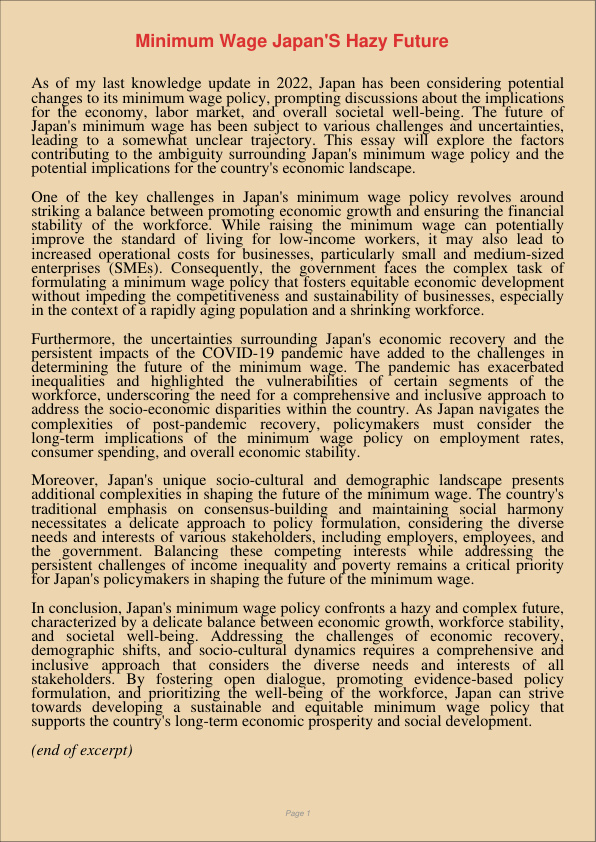Minimum Wage JapanS Hazy Future
Jan 6, 2024
minimum wage japan
hazy future
Business
Law

As of my last knowledge update in 2022, Japan has been considering potential changes to its minimum wage policy, prompting discussions about the implications for the economy, labor market, and overall societal well-being. The future of Japan’s minimum wage has been subject to various challenges and uncertainties, leading to a somewhat unclear trajectory. This essay will explore the factors contributing to the ambiguity surrounding Japan’s minimum wage policy and the potential implications for the country’s economic landscape.
One of the key challenges in Japan’s minimum wage policy revolves around striking a balance between promoting economic growth and ensuring the financial stability of the workforce. While raising the minimum wage can potentially improve the standard of living for low-income workers, it may also lead to increased operational costs for businesses, particularly small and medium-sized enterprises (SMEs). Consequently, the government faces the complex task of formulating a minimum wage policy that fosters equitable economic development without impeding the competitiveness and sustainability of businesses, especially in the context of a rapidly aging population and a shrinking workforce.
Furthermore, the uncertainties surrounding Japan’s economic recovery and the persistent impacts of the COVID-19 pandemic have added to the challenges in determining the future of the minimum wage. The pandemic has exacerbated inequalities and highlighted the vulnerabilities of certain segments of the workforce, underscoring the need for a comprehensive and inclusive approach to address the socio-economic disparities within the country. As Japan navigates the complexities of post-pandemic recovery, policymakers must consider the long-term implications of the minimum wage policy on employment rates, consumer spending, and overall economic stability.
Moreover, Japan’s unique socio-cultural and demographic landscape presents additional complexities in shaping the future of the minimum wage. The country’s traditional emphasis on consensus-building and maintaining social harmony necessitates a delicate approach to policy formulation, considering the diverse needs and interests of various stakeholders, including employers, employees, and the government. Balancing these competing interests while addressing the persistent challenges of income inequality and poverty remains a critical priority for Japan’s policymakers in shaping the future of the minimum wage.
In conclusion, Japan’s minimum wage policy confronts a hazy and complex future, characterized by a delicate balance between economic growth, workforce stability, and societal well-being. Addressing the challenges of economic recovery, demographic shifts, and socio-cultural dynamics requires a comprehensive and inclusive approach that considers the diverse needs and interests of all stakeholders. By fostering open dialogue, promoting evidence-based policy formulation, and prioritizing the well-being of the workforce, Japan can strive towards developing a sustainable and equitable minimum wage policy that supports the country’s long-term economic prosperity and social development.